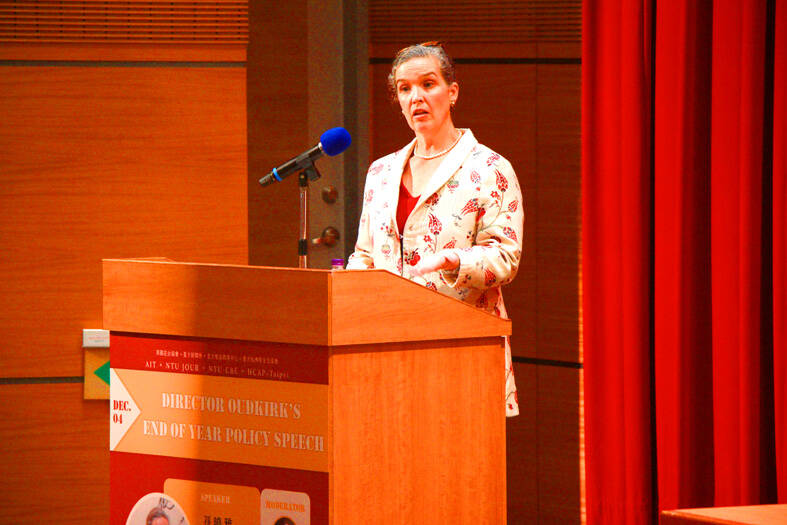Supporting Taiwan is one of the strongest consensuses in the US, American Institute in Taiwan (AIT) Director Sandra Oudkirk said yesterday, adding that the US is looking forward to working with whoever Taiwanese elect as president.
Oudkirk made the remark in a speech on cyberattacks and the manipulation of online information, at National Taiwan University (NTU) at the invitation of the school’s Graduate Institute of Journalism.
“I cannot think of a single other policy in Washington that is as strongly supported by both parties, both the administration and the [US] Congress, and is popular with the American people,” Oudkirk said.

Photo courtesy of National Taiwan University’s Graduate Institute of Journalism
There are people at the highest levels of the US government who were involved in drafting the Taiwan Relations Act, which serves as the guideline for the relations between Taiwan and the US, she said.
The “rock solid” support the US has for Taiwan “contributes to the maintenance of peace and stability across the Taiwan Strait,” Oudkirk said.
The US is working with Taipei to advance a shared vision of a free and open Indo-Pacific region that is connected, prosperous, secure and resilient — cooperation the AIT is striving to deepen, she said.
Having witnessed Taiwan’s democratic transition when she was posted in Taiwan as a visa officer in the 1990s, Oudkirk praised the nation as “a model of democracy” that is united by a broad commitment to defend a free, open and democratic society.
The US is “confident in Taiwan’s electoral processes and democratic system,” she said, adding that its policy on Taiwan “will remain the same, regardless of which party is in power.”
Oudkirk said that the US “is not taking sides in Taiwan’s election.”
Washington would also continue to support Taipei’s meaningful participation in the international community, she said.
Taiwan’s meaningful contributions to the world were clearly shown at the APEC meetings this year, such as its work with other APEC economies to help reduce the digital divide and encourage economic growth through digital transformation, Oudkirk said.
Working with Taiwan to effectively counteract cybersecurity threats has been one of the AIT’s priorities and a “common challenge” for Taiwan and the US, both of which continue to be targeted by cyberattacks, she said.
The two sides are collaborating on preventing and investigating cybercrime, providing capacity-building training for cyberprofessionals and policymakers, and bolstering Taiwan and US industry ties, Oudkirk said.
Industry should be involved in the formulation and implementation of cyberpolicies as it has advanced capabilities and tools to address and mitigate cyber-risks, as well as firsthand experience in protecting public and private networks, she said.
The US and Taiwan also work together to prevent disinformation from undermining public confidence in democracies and sowing division in societies — an effort that is especially important during election season, Oudkirk said.
An “active and informed public” is key to ensuring information integrity, so the US would continue to work with Taiwan and global partners to improve media literacy around the world, she said.
“We must support one another in these critical areas, because that is what partners do,” Oudkirk added.

An essay competition jointly organized by a local writing society and a publisher affiliated with the Chinese Communist Party (CCP) might have contravened the Act Governing Relations Between the People of the Taiwan Area and the Mainland Area (臺灣地區與大陸地區人民關係條例), the Mainland Affairs Council (MAC) said on Thursday. “In this case, the partner organization is clearly an agency under the CCP’s Fujian Provincial Committee,” MAC Deputy Minister and spokesperson Liang Wen-chieh (梁文傑) said at a news briefing in Taipei. “It also involves bringing Taiwanese students to China with all-expenses-paid arrangements to attend award ceremonies and camps,” Liang said. Those two “characteristics” are typically sufficient

A magnitude 5.9 earthquake that struck about 33km off the coast of Hualien City was the "main shock" in a series of quakes in the area, with aftershocks expected over the next three days, the Central Weather Administration (CWA) said yesterday. Prior to the magnitude 5.9 quake shaking most of Taiwan at 6:53pm yesterday, six other earthquakes stronger than a magnitude of 4, starting with a magnitude 5.5 quake at 6:09pm, occurred in the area. CWA Seismological Center Director Wu Chien-fu (吳健富) confirmed that the quakes were all part of the same series and that the magnitude 5.5 temblor was

The brilliant blue waters, thick foliage and bucolic atmosphere on this seemingly idyllic archipelago deep in the Pacific Ocean belie the key role it now plays in a titanic geopolitical struggle. Palau is again on the front line as China, and the US and its allies prepare their forces in an intensifying contest for control over the Asia-Pacific region. The democratic nation of just 17,000 people hosts US-controlled airstrips and soon-to-be-completed radar installations that the US military describes as “critical” to monitoring vast swathes of water and airspace. It is also a key piece of the second island chain, a string of

The Central Weather Administration has issued a heat alert for southeastern Taiwan, warning of temperatures as high as 36°C today, while alerting some coastal areas of strong winds later in the day. Kaohsiung’s Neimen District (內門) and Pingtung County’s Neipu Township (內埔) are under an orange heat alert, which warns of temperatures as high as 36°C for three consecutive days, the CWA said, citing southwest winds. The heat would also extend to Tainan’s Nansi (楠西) and Yujing (玉井) districts, as well as Pingtung’s Gaoshu (高樹), Yanpu (鹽埔) and Majia (瑪家) townships, it said, forecasting highs of up to 36°C in those areas